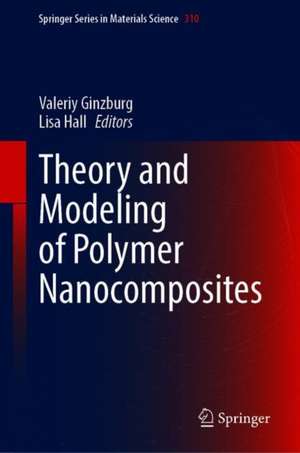Theory and Modeling of Polymer Nanocomposites: Springer Series in Materials Science, cartea 310
Editat de Valeriy V. Ginzburg, Lisa M. Hallen Limba Engleză Hardback – 17 dec 2020
| Toate formatele și edițiile | Preț | Express |
|---|---|---|
| Paperback (1) | 1000.87 lei 43-57 zile | |
| Springer International Publishing – 18 dec 2021 | 1000.87 lei 43-57 zile | |
| Hardback (1) | 847.79 lei 38-44 zile | |
| Springer International Publishing – 17 dec 2020 | 847.79 lei 38-44 zile |
Din seria Springer Series in Materials Science
- 18%
 Preț: 1820.22 lei
Preț: 1820.22 lei - 18%
 Preț: 776.09 lei
Preț: 776.09 lei - 24%
 Preț: 689.69 lei
Preț: 689.69 lei - 18%
 Preț: 968.96 lei
Preț: 968.96 lei - 20%
 Preț: 568.95 lei
Preț: 568.95 lei - 18%
 Preț: 953.65 lei
Preț: 953.65 lei - 18%
 Preț: 902.36 lei
Preț: 902.36 lei - 18%
 Preț: 953.65 lei
Preț: 953.65 lei - 20%
 Preț: 948.42 lei
Preț: 948.42 lei - 18%
 Preț: 1143.07 lei
Preț: 1143.07 lei - 18%
 Preț: 1111.53 lei
Preț: 1111.53 lei - 18%
 Preț: 1103.62 lei
Preț: 1103.62 lei - 18%
 Preț: 1225.94 lei
Preț: 1225.94 lei -
 Preț: 473.91 lei
Preț: 473.91 lei - 18%
 Preț: 782.42 lei
Preț: 782.42 lei -
 Preț: 433.47 lei
Preț: 433.47 lei - 18%
 Preț: 1116.40 lei
Preț: 1116.40 lei - 18%
 Preț: 946.24 lei
Preț: 946.24 lei - 18%
 Preț: 945.20 lei
Preț: 945.20 lei - 18%
 Preț: 1114.21 lei
Preț: 1114.21 lei - 15%
 Preț: 641.20 lei
Preț: 641.20 lei - 18%
 Preț: 958.56 lei
Preț: 958.56 lei - 18%
 Preț: 1224.36 lei
Preț: 1224.36 lei - 15%
 Preț: 644.82 lei
Preț: 644.82 lei - 24%
 Preț: 833.45 lei
Preț: 833.45 lei - 24%
 Preț: 1060.36 lei
Preț: 1060.36 lei - 18%
 Preț: 964.10 lei
Preț: 964.10 lei - 18%
 Preț: 1224.36 lei
Preț: 1224.36 lei - 18%
 Preț: 1221.20 lei
Preț: 1221.20 lei - 18%
 Preț: 946.87 lei
Preț: 946.87 lei - 18%
 Preț: 1836.92 lei
Preț: 1836.92 lei - 15%
 Preț: 643.34 lei
Preț: 643.34 lei - 18%
 Preț: 1246.32 lei
Preț: 1246.32 lei - 18%
 Preț: 956.81 lei
Preț: 956.81 lei - 18%
 Preț: 953.52 lei
Preț: 953.52 lei - 15%
 Preț: 637.59 lei
Preț: 637.59 lei
Preț: 847.79 lei
Preț vechi: 1115.51 lei
-24% Nou
Puncte Express: 1272
Preț estimativ în valută:
162.28€ • 176.33$ • 136.40£
162.28€ • 176.33$ • 136.40£
Carte tipărită la comandă
Livrare economică 16-22 aprilie
Preluare comenzi: 021 569.72.76
Specificații
ISBN-13: 9783030604424
ISBN-10: 303060442X
Pagini: 316
Ilustrații: XIX, 316 p. 150 illus., 130 illus. in color.
Dimensiuni: 155 x 235 mm
Greutate: 0.64 kg
Ediția:1st ed. 2021
Editura: Springer International Publishing
Colecția Springer
Seria Springer Series in Materials Science
Locul publicării:Cham, Switzerland
ISBN-10: 303060442X
Pagini: 316
Ilustrații: XIX, 316 p. 150 illus., 130 illus. in color.
Dimensiuni: 155 x 235 mm
Greutate: 0.64 kg
Ediția:1st ed. 2021
Editura: Springer International Publishing
Colecția Springer
Seria Springer Series in Materials Science
Locul publicării:Cham, Switzerland
Cuprins
Introduction.- Part I. Structure and Morphology.- Chapter 1. Atomistic and Molecular Modeling of Polymer Nanocomposites.- Chapter 2. Coarse-grained modeling: Particle-based Approaches.- Chapter 3. Coarse-grained modeling: Field-based Approaches.- Chapter 4. Multiscale modeling examples.- Part II. Dynamics and Rheology.- Chapter 5. Diffusion in Polymer Nanocomposites.- Chapter 6. Linear Rheology of Polymer Nanocomposites.- Chapter 7. Nonlinear Rheology and Mechanics of Polymer Nanocomposites.- Part III. Physical Property Prediction.- Chapter 8. Thermal Conductivity.- Chapter 9. Electrical Conductivity.- Chapter 10. Optical Properties.- Chapter 11. Barrier Properties.- Chapter 12. Dielectric Breakdown.- Chapter 13. Flammability.- Summary.- Index.
Textul de pe ultima copertă
This edited volume brings together the state of the art in polymer nanocomposite theory and modeling, creating a roadmap for scientists and engineers seeking to design new advanced materials. The book opens with a review of molecular and mesoscale models predicting equilibrium and non-equilibrium nanoscale structure of hybrid materials as a function of composition and, especially, filler types. Subsequent chapters cover the methods and analyses used for describing the dynamics of nanocomposites and their mechanical and physical properties. Dedicated chapters present best practices for predicting materials properties of practical interest, including thermal and electrical conductivity, optical properties, barrier properties, and flammability. Each chapter is written by leading academic and industrial scientists working in each respective sub-field. The overview of modeling methodology combined with detailed examples of property predictions for specific systems will make this book usefulfor academic and industrial practitioners alike.
Caracteristici
Provides a roadmap for researchers designing new polymer nanocomposites Presents best practices for predicting and tuning special properties of potential new materials Combines modeling methodology with detailed examples for broad appeal Brings together academic and industry perspectives
